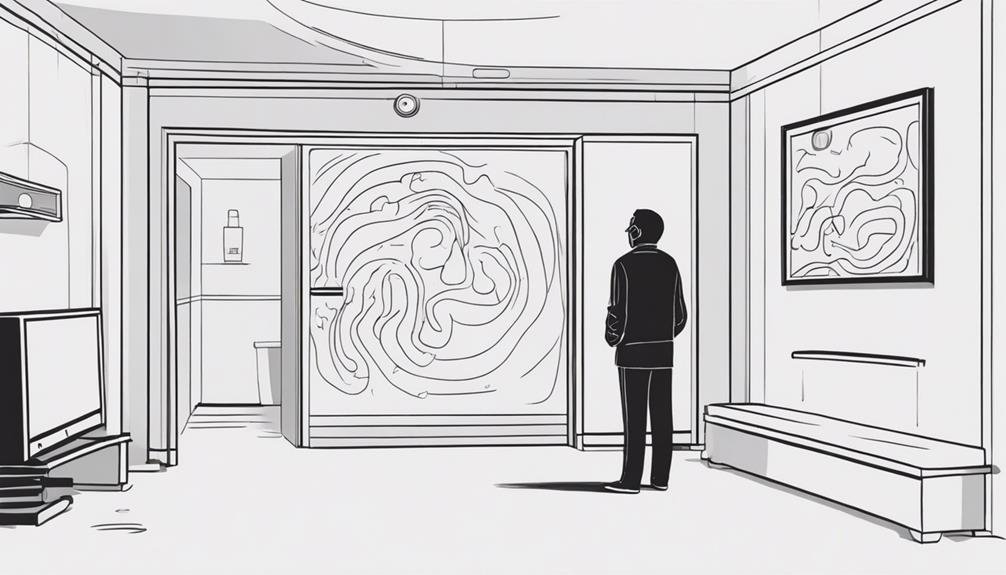When it comes to your home's septic system, sometimes the signs of trouble aren't as obvious as a flashing warning light. Imagine your septic tank as the quiet guardian beneath your property, silently managing waste until one day, it's not. Foul odors wafting from drains and slow drains are just the beginning.
But what happens when the signs manifest outdoors, in your yard, whispering secrets about what lies beneath? Stay alert to the subtle cues nature may be offering you; they could be the key to averting a messy situation.
Key Takeaways
- Foul odors like rotten eggs indicate septic backup.
- Slow drainage from fixtures may signal larger plumbing issues.
- Lush grass over drainfield suggests septic system problems.
- Outdoor signs include soggy patches and sinkholes near the septic system.
Foul Odors Indoors

Do you notice a persistent foul odor indoors that resembles rotten eggs? This could be a sign of a septic tank backup. When there's a backup, gases like hydrogen sulfide are released, causing that unpleasant smell. Apart from the odor, mold growth may also occur due to the excess moisture from the backup.
Mold thrives in damp environments and can pose serious health hazards to you and your family. Exposure to mold can lead to respiratory issues, allergies, and other health problems. Therefore, it's crucial to address any foul odors promptly to prevent mold growth and potential health risks.
If you detect such odors, it's essential to investigate the cause promptly. Ignoring the issue could lead to further problems with your septic system and indoor air quality. By addressing the foul odors early on, you can prevent mold growth and mitigate potential health hazards associated with septic tank backups.
Slow Draining Fixtures
Experiencing sluggish drainage from your fixtures? Slow draining fixtures can be a sign of potential septic tank issues. Here are some essential tips to address this problem:
- Check for Clogs: Start by inspecting the affected fixtures for any visible clogs. Hair, debris, or mineral buildup could be causing the slow drainage. Use a drain snake or plunger to try and clear the blockage.
- Evaluate Multiple Fixtures: If more than one fixture is draining slowly, it could indicate a larger plumbing issue. Conduct a plumbing inspection to identify any underlying problems within your septic system.
- Regular Maintenance: Prevent future slow drainage by implementing routine maintenance. Consider scheduling regular septic tank pump-outs and inspections to keep your system running smoothly.
Lush Grass Over Drainfield

If you notice an unusually lush patch of grass over your drainfield, it could be a sign of potential septic system issues that require attention. This sudden burst of greenery may indicate soil saturation, a common problem that arises when the drainfield isn't functioning correctly. Soil saturation can occur when the septic system is overwhelmed, leading to excess water pooling in the drainfield area.
To address this issue, it's essential to consider drainfield maintenance. Regular maintenance helps prevent septic system failures and ensures that the drainfield can effectively filter wastewater. Neglecting drainfield maintenance can result in backups, foul odors, and environmental contamination. By keeping up with routine inspections and pumping when necessary, you can extend the lifespan of your septic system and avoid costly repairs.
Gurgling Sounds From Drains
When you hear gurgling sounds coming from your drains, it may indicate potential issues within your plumbing system that require prompt attention. These noises aren't just annoying; they could be a sign of a developing problem that needs to be addressed to prevent more significant issues down the line.
Here are three essential points to consider regarding gurgling sounds from drains:
- Plumbing Maintenance: Regular plumbing maintenance is crucial to prevent blockages and ensure proper water flow. Neglecting maintenance can lead to buildup in the pipes, causing gurgling sounds and potential backups.
- Drain Cleaning: Scheduling routine drain cleaning can help prevent gurgling sounds by removing debris and buildup that could be obstructing the flow of water. Professional drain cleaning services can effectively clear out any blockages and restore proper drainage.
- Professional Inspection: If you consistently hear gurgling sounds from your drains, it's advisable to have a professional plumber inspect your plumbing system. They can identify the root cause of the issue and provide the necessary repairs to restore optimal functionality.
Conclusion
In conclusion, identifying signs of septic tank backup is crucial for maintaining a healthy home environment. By paying attention to foul odors indoors, slow draining fixtures, lush grass over the drainfield, and gurgling sounds from drains, you can prevent costly and messy backups.
Remember, a little awareness goes a long way in avoiding potential septic tank disasters. Stay vigilant and keep your home in top shape to avoid any unpleasant surprises down the road.

